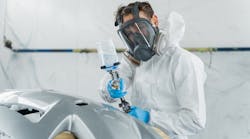A roomful of body repair industry professionals and attorneys from three states learned a variety of methods to help them collect their short- paid invoices from payers/insurers at a recent full-day seminar in Waltham, Mass.
Participants were instructed on how to create their own pricing structures, charge for all products sold and work performed, and to set up a method for collecting invoices not fully paid, including the use of the court system, especially for simple breach of contract cases.
Long-time independent industry advocates, Tony Lombardozzi and Peter Abdelmaseh, spoke of the main reasons shop owners have fallen into the poor financial condition that plagues the industry, mainly the passive acceptance of what they refer to as the “Insurer Control and Payment System” or “ICPS.” Lombardozzi and Abdelmaseh are co-founders of Superare Advertising + Marketing Agency located in Belmont, MA.
Lombardozzi and Abdelmaseh contend the ICPS has been constructed by many insurers that employ “pricing levers,” such as so-called labor rate “surveys,” dollars times hours product pricing, and the ubiquitous “we don’t pay for that” response to random invoice line items. It was explained that insurers use these levers as negotiating techniques and that they are designed with just one goal in mind: to suppress normal free market pricing mechanisms. Shops were advised to simply reject and “work around” that system.
Shop owners were shown how the “ideal process” would work, along with the documentation and legal principles that could make “doing it the right way” practical for shops, and present a significant challenge for insurers to defend against. The presenters stressed that using the proper contracts and documentation – what they referred to as “the document package” – would constitute high quality, believable evidence in a courtroom.
A segment of the presentation focused on fear and how it affects the body shop repair industry. The audience was told that fear was the basis of the entire insurance industry – after all, fear is why people and companies buy policies – and insurers turn that fear against their vendors as well. Fear causes irrational decision-making and distorts pricing as well.
There was a high level of interaction with the audience, including several exchanges regarding legal issues. As the question-and-answer session wound down, many participants expressed satisfaction with the knowledge they gained at the seminar and were anxious to implement the proper practices in their own shops. The event ended with a preview of new seminars under development, the company’s consulting services, and a short presentation of Superare’s branded marketing program, UltiSure®, that will be released soon to the industry.

